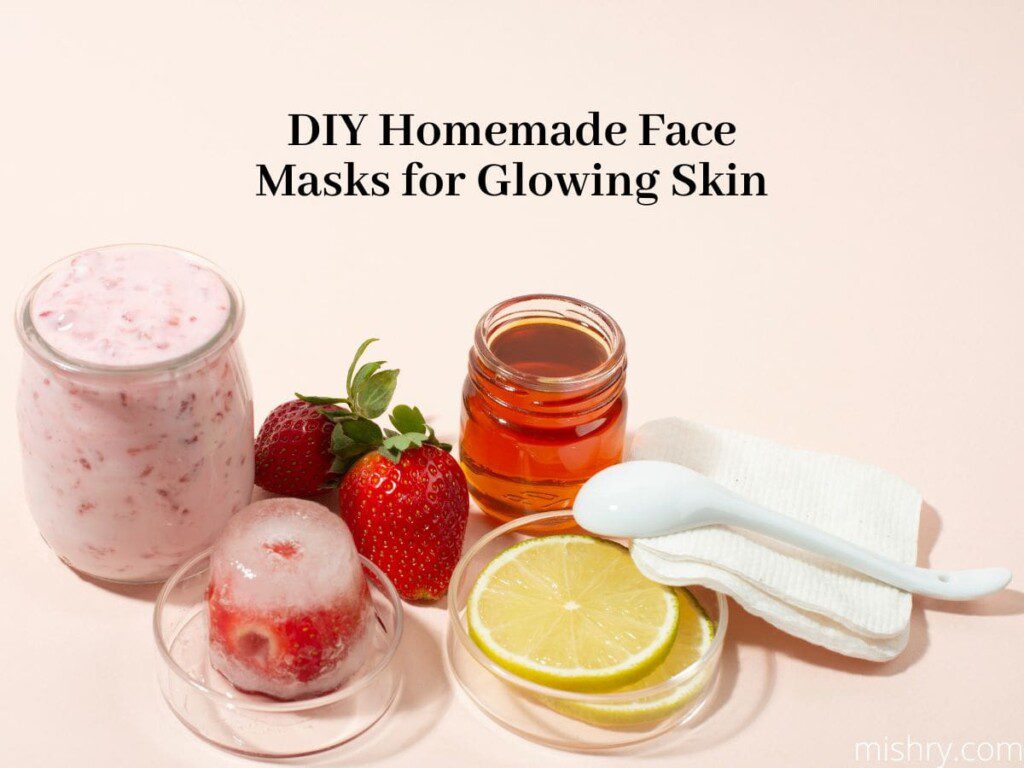Pamper your skin without breaking the bank! Whip up a DIY face mask using natural ingredients readily available in your kitchen. These masks effectively target various concerns like dryness, acne, dullness, and uneven skin tone.
The best part? Customization! Tailor the mask to your unique needs. Want to brighten your skin? Try yogurt and turmeric. Need deep hydration? Opt for avocado and honey.
Incorporating DIY masks into your routine is not only fun and cost-effective, but also a powerful way to show your skin some love.
Table of Contents
Benefits of Applying Homemade Face Masks

Using homemade facial masks can offer numerous benefits for your skin. Below are some potential advantages that you can gain from incorporating DIY face masks into your skincare routine:
1. Cost-effective
Making your facial masks at home can be a cost-effective alternative to purchasing expensive commercial skincare products. You can use ingredients that are readily available in your kitchen, which can save you money in the long run.
2. Natural Ingredients
Homemade masks usually consist of natural ingredients without any added chemicals, preservatives, or artificial fragrances. By using natural ingredients, you can avoid harsh chemicals that may irritate your skin or cause allergies.
3. Customization
One of the benefits of making your own facial masks is that you have complete control over the ingredients. You can customize the mask based on your skin type and specific skincare needs. This allows you to address any specific skin concerns you may have.
4. Hydration
Many homemade masks contain moisturizing ingredients like honey, yogurt, or avocado, which can help to hydrate and nourish your skin. This can be particularly beneficial if you have dry or dehydrated skin.
5. Antioxidant properties
DIY masks often incorporate ingredients such as fruits and green tea, which are rich in antioxidants. These antioxidants can help to fight free radicals and protect your skin from environmental damage, such as pollution and UV rays.
6. Exfoliation
Some homemade masks, like those with oatmeal or coffee grounds, can provide gentle exfoliation. This can help to remove dead skin cells, unclog pores, and promote a smoother, brighter complexion.
7. Soothing and Calming
Homemade masks with ingredients like aloe vera, cucumber, or chamomile can have soothing effects on your skin. These ingredients can help to reduce inflammation, redness, and irritation, making them ideal for people with sensitive skin.
8. Brightening and Toning
Certain ingredients like lemon, turmeric, or papaya may have skin-brightening properties. These ingredients can help to even out your skin tone, reduce hyperpigmentation, and promote a more radiant complexion.
9. Acne control
Homemade masks with ingredients like tea tree oil, honey, or clay may have antibacterial properties. These ingredients can help to control acne by reducing inflammation, killing bacteria, and unclogging pores.
10. Relaxation
Applying a facial mask can be a relaxing and self-care ritual that can help to promote overall well-being and reduce stress. By taking the time to care for your skin, you can also give yourself a much-needed break from the demands of daily life.
Do DIY Face Masks Work?
It depends. While certain natural ingredients like oatmeal and honey have known benefits, their effectiveness depends on:
- Ingredients: Choose ingredients suited to your skin type. Nourishing masks may clog oily skin, while dry skin benefits from them.
- Consistency: Like any routine, consistent use is key for seeing results.
- Individuality: Skin sensitivity and allergies can affect results. Patch-test new ingredients first.
DIY masks can be a fun addition to your routine, but they may not be a complete skincare solution. Consider them as a complement to other products like cleansers, moisturizers, and serums.
DIY Masks: Are They Safe To Use?
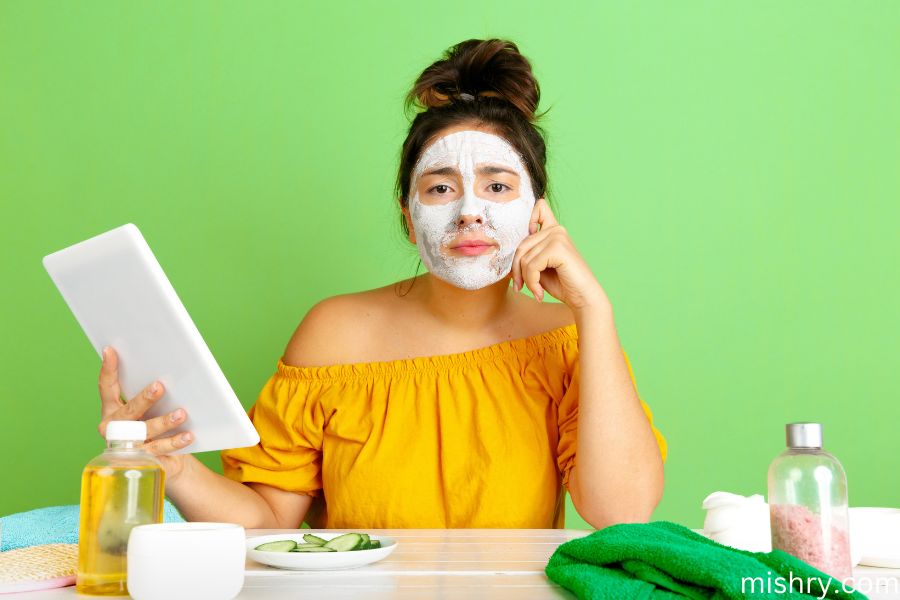
Before opting for homemade DIY face masks, safety and concern often remains a question. To address this, let us explore some aspects below :
Embrace the natural: DIY masks offer a tempting alternative to store-bought products, allowing you to harness the power of nature’s bounty. But before diving in, remember – safety first!
Patch testing is key: This simple step helps identify potential allergies by applying a small amount of the mask to your forearm and waiting 24 hours. Avoid using the mask if you experience redness, itching, or burning.
Freshness matters: Opt for high-quality, fresh ingredients. Expired or spoiled ingredients can harbor bacteria and irritate your skin.
Cleanliness counts: Wash your hands thoroughly and use clean utensils to prepare and apply the mask. This minimizes the risk of introducing bacteria to your skin.
Be gentle: Avoid harsh ingredients like lemon juice or undiluted essential oils, especially if you have sensitive skin. These can cause irritation and dryness.
Listen to your skin: Pay close attention to how your skin reacts during and after use. If you experience any discomfort, remove the mask immediately and rinse your face with lukewarm water.
Moisturize: After removing the mask, apply a gentle moisturizer to soothe and hydrate your skin. This helps restore its natural barrier and prevent dryness.
Seek professional advice: If you have specific skin concerns like acne, eczema, or rosacea, consult a dermatologist before using DIY masks. They can recommend suitable ingredients and ensure the mask aligns with your unique needs.
By following these guidelines, you can explore the world of DIY masks with confidence, enjoying the benefits of natural skincare while minimizing the risk of adverse reactions. Remember, a little precaution goes a long way in keeping your skin happy and healthy!
Homemade Acne Masks
1. Honey & Cinnamon Mask
- Here’s a recipe for a natural face mask that you might find useful. To make it, you’ll need 1 tablespoon of honey and 1 teaspoon of cinnamon.
- Mix the honey and cinnamon thoroughly until they form a smooth paste.
- Once the paste is ready, apply it evenly to your face, avoiding your eyes and mouth.
- Let the mask sit for about 10-15 minutes, allowing the honey and cinnamon to work their magic.
- After that, rinse it off with warm water and pat your face dry.
- Honey is known for its antibacterial properties, which can help to cleanse your skin, while cinnamon has anti-inflammatory and antimicrobial benefits that may help to reduce redness and irritation.
Cinnamon can be highly irritating for some, so make sure you conduct a patch test before applying.
2. Turmeric and Yogurt Mask
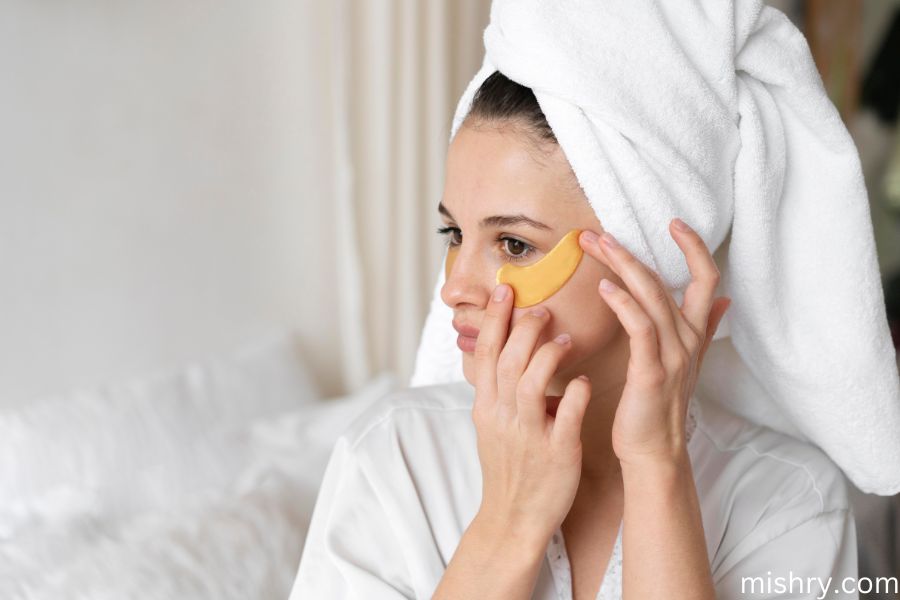
- If you’re looking for a natural way to improve your skin’s health, you might want to try making a turmeric and yogurt mask.
- This mask is made by mixing 1 teaspoon of turmeric with 1 tablespoon of plain yogurt until a paste is formed.
- Once the paste is ready, apply it evenly to your face and let it sit for 15-20 minutes before washing it off with warm water.
- The combination of turmeric and yogurt can work wonders for your skin.
- Turmeric is known for its powerful anti-inflammatory and antibacterial properties, which can help reduce redness, inflammation, and acne on your skin.
- Meanwhile, yogurt is a great natural exfoliant that can help soothe and hydrate your skin, leaving it feeling soft, smooth, and refreshed.
3. Tea Tree Oil and Aloe Vera Mask
- This mask is composed of 2 drops of tea tree oil and 1 tablespoon of aloe vera gel, which can be blended to form a powerful concoction that helps treat a variety of skin issues.
- Tea tree oil is renowned for its potent antimicrobial properties, which makes it highly effective in combating acne, fungal infections, and other skin concerns.
- On the other hand, aloe vera is a natural anti-inflammatory agent that can help soothe and calm irritated skin.
- To use this mask, simply mix the ingredients and apply the mixture to the affected areas of your skin, allowing it to work its magic and alleviate your skin concerns.
4. Papaya and Honey Mask
- Here is a simple yet effective recipe for a Papaya and Honey Mask that you can try at home.
- You will need 1/2 cup of ripe papaya that has been mashed and 1 tablespoon of honey.
- Once you have these ingredients, blend them until they form a smooth paste.
- To apply the mask, first, cleanse your face with a gentle cleanser and pat it dry.
- Then, using your fingers, apply the mask all over your face, avoiding the eye area.
- Leave it on for 15-20 minutes, during which time the papaya enzymes will work to exfoliate your skin, leaving it feeling smooth and refreshed.
- The honey, on the other hand, will provide antibacterial benefits, helping to keep your skin free from impurities.
- After the time is up, gently rinse off the mask with lukewarm water and pat your face dry with a soft towel.
- You can use this mask once a week to keep your skin looking its best.
Homemade Masks For Dry Skin
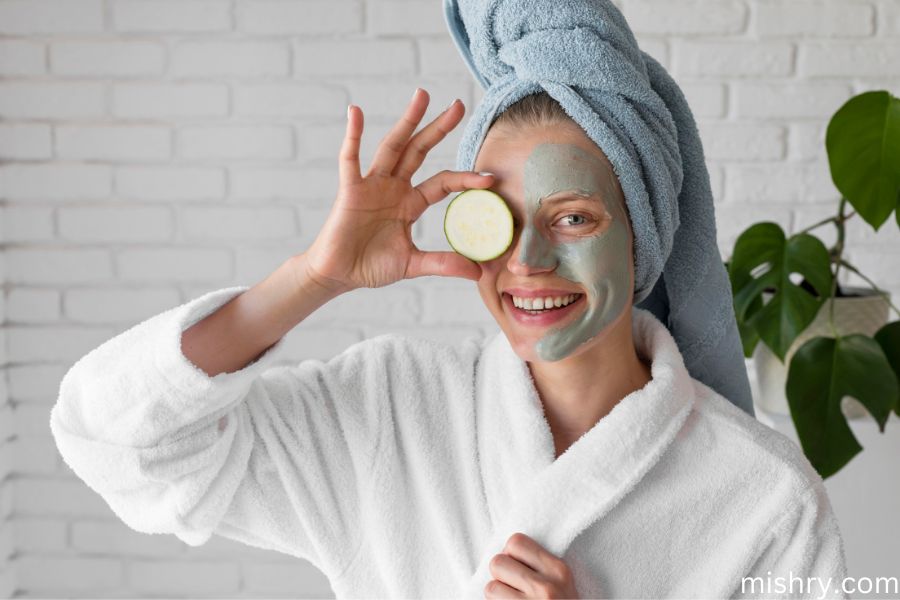
1. Avocado and Honey Mask
- To make this mask, all you need is half a ripe avocado and a tablespoon of honey.
- After mashing the avocado and mixing it with honey, apply the mixture to your face gently, and circularly.
- Allow the mask to work its magic for 15-20 minutes before rinsing off with lukewarm water.
- The avocado is a rich source of healthy fats and vitamins that can nourish and revitalize your skin, while the honey acts as a natural moisturizer, locking in your skin’s moisture.
- With regular use, this mask can help you achieve a healthy, radiant complexion that you’ll love.
2. Banana and Yogurt Mask
Here is a simple and effective recipe for a Banana and Yogurt Mask that you can easily prepare at home.
- All you need is half a ripe banana and a tablespoon of plain yogurt.
- To make the mask, mash the banana and mix it well with the yogurt until it forms a smooth paste.
- Once the paste is ready, apply it to your face and leave it on for about 15 minutes.
- The banana in the mask provides essential vitamins and moisture to your skin, while the yogurt helps to hydrate and exfoliate gently.
- This mask is perfect for people with dry or sensitive skin, as it is gentle and nourishing.
3. Yogurt and Honey Mask
- This easy-to-make Yogurt and Honey Mask is the perfect remedy for dry, dull skin.
- You’ll need just two simple ingredients – 2 tablespoons of plain yogurt and 1 tablespoon of honey.
- Mix them to create a smooth paste, and then apply it to your face.
- Allow the mask to sit for 15-20 minutes, allowing the natural properties of the yogurt and honey to work their magic.
- The yogurt will gently exfoliate your skin, while the honey will provide deep hydration, leaving your skin feeling soft, smooth, and refreshed.
4. Coconut Oil and Oatmeal Mask
- Indulge in the goodness of a Coconut Oil and Oatmeal Mask which is an easy-to-make and effective solution for achieving radiant skin.
- This amazing mask requires only two ingredients – 1 tablespoon of organic coconut oil and 2 tablespoons of finely ground oatmeal.
- Mix the two ingredients to form a smooth paste that will gently exfoliate and deeply moisturize your skin.
- Apply the mask generously on your face and neck and leave it on for about 15 minutes.
- The nourishing properties of coconut oil will hydrate and replenish your skin while the finely ground oatmeal will soothe and calm any inflammation or irritation.
- With regular use, this natural mask will leave your skin feeling soft, smooth, and rejuvenated.
Homemade Masks Suitable For Oily Skin
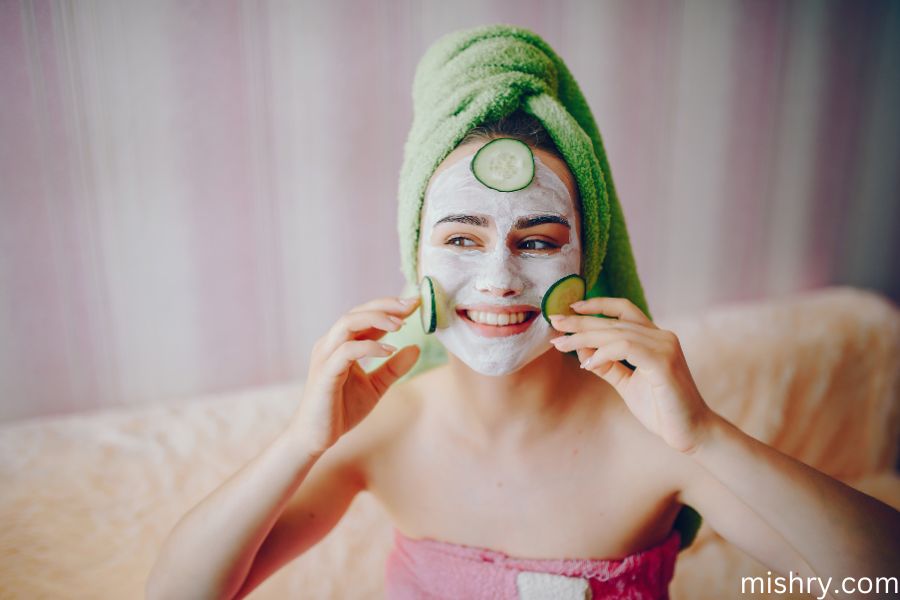
1. Tomato and Yogurt Mask
- This mask contains two key ingredients that work together to provide your skin with a range of benefits.
- Firstly, the small ripe tomato that is blended into the mask contains natural acids that help regulate oil production and tighten pores, making your skin look smoother and more refined.
- Secondly, the plain yogurt that is added to the mask provides gentle exfoliation that removes dead skin cells and promotes healthy skin cell renewal.
- Additionally, the yogurt also offers hydration that will leave your skin feeling soft and supple.
- To use this mask, simply mix the blended tomato with the yogurt, apply it to your face, and leave it on for 15 minutes.
- After that, rinse it off with warm water and enjoy the benefits of a glowing, healthy-looking complexion.
2. Cucumber and Mint Mask
- Here’s a simple and refreshing recipe for a cucumber and mint face mask. To make this mask, first, blend half a cucumber until it forms a smooth paste.
- Next, take 5-6 fresh mint leaves and crush them into a fine powder.
- Then, mix the crushed mint leaves into the cucumber paste.
- Gently apply the mask to your face and leave it on for about 15-20 minutes.
- As you relax, the cucumber will help to soothe and hydrate your skin, while the mint has a cooling effect that can help to control oiliness.
- This mask is a great way to refresh and rejuvenate your skin, leaving you feeling cool, calm, and collected.
3. Green Tea and Honey Mask
- For a nourishing and refreshing mask that can help regulate oil production and reduce inflammation, try the Green Tea and Honey Mask.
- To make this mask, mix 1 tablespoon of cooled brewed green tea with 1 teaspoon of honey.
- Green tea is rich in antioxidants that can help your skin stay healthy and balanced, while honey provides moisture and hydration for a more supple and glowing complexion.
- Simply apply the mixture onto your face and leave it on for 15 minutes, then rinse off with warm water and pat dry.
4. Papaya and Lemon Mask
- This face mask recipe is perfect for those who want to get rid of dead skin cells and control oiliness.
- To make this Papaya and Lemon Mask, you’ll need 1/4 of a ripe papaya that is mashed and 1 teaspoon of lemon juice.
- Mix the mashed papaya with the lemon juice and apply the mask on your face.
- Let it sit for 10-15 minutes and then rinse it off.
- Papaya contains enzymes that are known to exfoliate dead skin cells effectively, while lemon juice has astringent properties that help to control oil production.
Conclusion
DIY masks offer a fun and affordable way to pamper your skin and address minor concerns. However, approach them with caution. Never rely solely on them for serious issues or if you’re unsure of your skin’s needs – consult a dermatologist. For allergies or sensitivities, always check ingredients and patch test before applying.
Remember, responsible practices are key for healthy skin. Enjoy DIY masks, but prioritize professional advice for significant concerns.
Buying from the links on this page may earn us a fee. Please read our complete ethics statement here.

